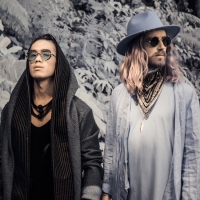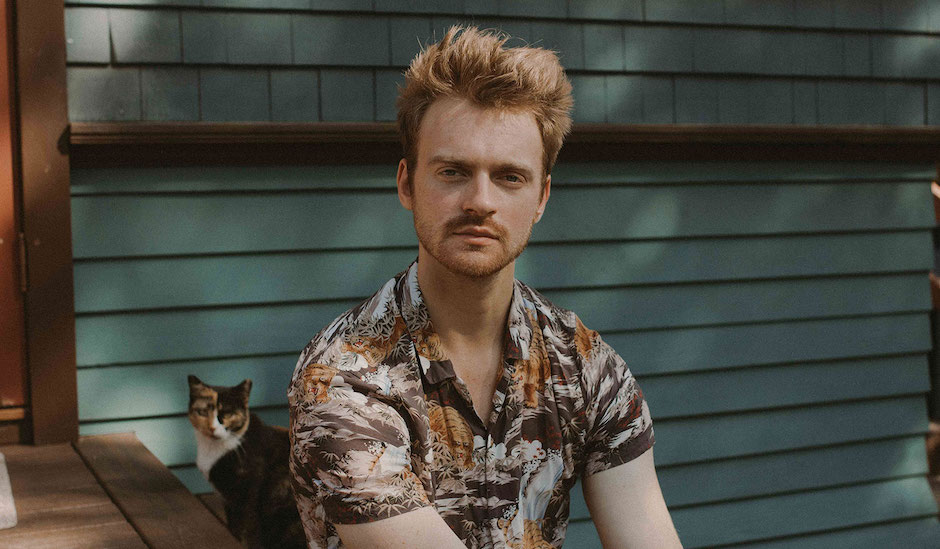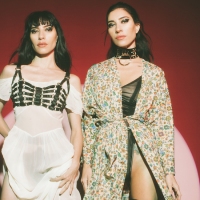 Catching up with SLUMBERJACK: "At the moment, it’s all about music for us."Off the back of their SARAWAK EP and in the midst of a US tour, the Perth ex-pats fill us in on what's been happening.
Catching up with SLUMBERJACK: "At the moment, it’s all about music for us."Off the back of their SARAWAK EP and in the midst of a US tour, the Perth ex-pats fill us in on what's been happening.

FINNEAS, Billie Eilish’s left-hand man, steps into the spotlight
Recently in the country with his chart-dominating sister, we talk to Finneas about being thrown into fame, songwriting and industry pressures.
Header image by Teren Mabry.
There are a few things FINNEAS wants you to know. The first is that he’s left-handed – it’s something prevalent across his social media, whether it be in off-shoot Twitter mentions or littered through his social media biographies. The second is that he’s his own artist, and he’s not just stepping into the spotlight – he’s basking in it.
Over the last three years, FINNEAS – born Finneas O’Connell – has become well-accustomed to the spotlight and the highs and lows that come alongside, thrown into it by the rapid rise of his sister Billie Eilish. He’s often her sole collaborator, holding primary writing and production credits on her entire discography while also playing alongside her on stage, transforming the haunting intimacy of her debut album’s intricate production into the live realm while she sings alongside; every razor-sharp sample and bass growl as impactful as it is on record.
He’s in the country with his sister for a tour that’s proved her dominance stronger with every stop (at a Sydney industry event, she was forced to stop performing so paramedics could attend to a fainted girl; in Brisbane, following Finneas’ solo performance, crowds had to be told to step back to prevent crushing – the entire event on cancellation’s edge due to increased risk factor), doubling down on the blistering success of her debut album, WHEN WE ALL FALL ASLEEP, WHERE DO WE GO?, which has peaked at the top of almost every major Western music chart and dominated much of the pop music discourse across the last six months.
Listening to WHEN WE ALL FALL ASLEEP, WHERE DO WE GO?, it’s not hard to understand Billie’s broad, cross-market appeal. Tracks like bad guy and ilomilo blend accessible pop hooks and witty lyricism with thick house grooves and haunting synth twangs respectively, while tracks including two of the album’s leads – wish you were gay and when the party’s over – take ballad-like form, layering Billie’s emotive vocal with productions often stripped back to its most intimate and raw.
However, unlike many major label pop records this side of the Max Martin explosion, WHEN WE ALL FALL ASLEEP, WHERE DO WE GO? is an album that places its instrumentals just as highly as its lead vocal; Finneas’ productions taking up just as much space as Billie’s haunting and mysterious drawl as the record grows longer and more versatile.
As a result, Finneas’ productions and songwriting are now entering the spotlight. In some ways, he’s become just as adored and admired as his sister; his socials inundated with ‘stans’ – hardcore, often-social media dominating super fans – applauding and sharing his every song, picture and even social media updates, while songs such as his latest, I Lost A Friend, conjure millions of plays in under a month.
For many artists, being thrown into the spotlight can be problematic, especially in regards to the aforementioned stan culture and the toxicity that can often come with it; something that Billie has battled since her early rise. Speaking over the phone from Sydney, Finneas admits that being thrown into the deep end of fame can be exhausting, but there are ways to fight against it. “I think it’s just really important to just have fun wherever your career is taking you because if you focus too much on trying to achieve things, you aren’t able to fully enjoy everything along the way,” he says. “Everything feels exciting if you let it feel exciting. You don’t need to worry about six months from now.”

Finneas began to explore the idea of a solo act while his sister was breaking out with Ocean Eyes, back in 2016. After two singles – his debut, New Girl and the Gabrielle Current-featuring Evermore – things got too busy with Billie; writing and recording what would eventually become her break-out EP, don’t smile at me, after signing a deal with US mega-label Interscope. Throughout late-2017 and into 2018, however, Finneas refocused on his solo project, using free time amongst a schedule largely dominated by touring and promo to create a strong back catalogue of singles that he’d release over the year ahead – eight, to be exact, capped with the romantic Let’s Fall in Love for The Night.
“We spent most of 2018 working on Billie’s album [‘exactly the album that we wanted to make,’ he later elaborates], so all the tracks I put out through the year were actually banked up from the end of 2017,” he explains. “I rolled them out one at a time over the course of like eight months. I was putting stuff out all the time.”
In 2019, however, he’s approaching things differently – doing things “the opposite way,” he says. In the midst of an extensive, multi-continent album tour, Finneas is utilising downtime in hotel rooms and in transit as a time to write his own material, typically released as close to finishing as possible. “The advantage of not sitting in one place for too long means I have to the opportunity to write and record a lot while we tour."
"Everything feels exciting if you let it feel exciting."
- FINNEAS.
The first taste of this new writing pattern, Claudia, is as refined as it is romantic. It’s an ode to his partner Claudia Sulewski, with starry-eyed lyrics (“I think you’re gonna change my plans with those emerald eyes / And you don’t even understand just how far I’d drive,” he sings in its closing outro) meeting tender keys and gritty bass which only perks up after its opening chorus. I Lost A Friend, his second single for 2019, brings a similar comparison; lyrical vulnerability finding itself layered with subtle glitches and soft piano chords.
“Vulnerability and the intimacy that comes with it is really important to me in songwriting,” he explains. “I want to get to know someone while I listen to their music, otherwise, I just don’t feel as connected to it.” This intimacy is something that’s come to define his songwriting both as a solo artist and with Billie, whether it be as straight-forward as lyrically, or through something like writing the entirety of WHEN WE ALL FALL ASLEEP, WHERE DO WE GO? at their parent’s place, with the exception of starting bury a friend in Chicago on a day off, and wish you were gay, which was started in North Carolina.
I Lost A Friend is a single cemented with this vulnerability and a sense of relatability that comes with it, using everyday metaphors on casual human nature to paint the picture of a long friendship falling apart. “I wanted to verbalise this meaning in a way that didn’t seem self-aggrandizing or hostile in any way, so I decided to use things everybody does – things that maybe aren’t poetic to sing about it – to create this basic understanding which people are really capable of relating to,” he says. ‘I lost a friend like keys in a sofa, like a wallet in the backseat,’ he sings in the opening lines, providing perhaps the most obvious example of these metaphors. “I think it’s something that a lot of people are attracted to in Billie’s music as well.”
In a way, Finneas’ rise is a by-product of the international attention directed at Billie, but it’s also a by-product of a larger, industry-wide shift towards songwriters and producers once only recognised behind-the-scenes. Spotify, for example, is actively platforming songwriters through its Secret Genius Program – offering songwriting camps and incentives to highlight who’s deemed the next generation of songwriting and production – while music databases like Genius host credit scrawls once often found only in liner notes. As a result, these songwriters and producers are becoming just as applauded as the pop stars they work alongside, profiled by The FADER and Billboard for covers and long-reads once only reserved for acts deemed more in the spotlight.
It’s something Finneas agrees with (“I think it’s really cool, we’ve come a long way from reading notes on a physical album,” he reaffirms) and he’s grateful of the attention thrown his way through Billie’s international profile, but it also comes with some extra pressures.
There’s an evident crossover between Finneas’ solo work and what he makes alongside Billie, but in a situation like this, artists may find pressure to cater to the easy audience this brings, while trying to match – exceed, even – the expectations of other fans and newcomers. In saying that, however, it’s clear it’s something Finneas isn’t affected by. For example, despite being a major artist bound for large-scale success, he’s kept independent; ignoring the pressing offers from major labels.
“I don’t put any pressure on myself to cater to anyone at all, whether it be with myself or with Billie’s work,” he explains. “Billie and I have been incredibly authentic in our music, we didn’t even put that pressure on ourselves recording WHEN WE ALL FALL ASLEEP, WHERE DO WE GO? – the reception has exceeded our expectations for what it could ever do.”

From here, options are open for Finneas. He’s just concluded a completely sold-out run of Australian shows as one of Billie’s band members and her sole opening act, and I Lost A Friend is proving that Finneas’ authentic and open approach to songwriting can be commercially viable - a difficult feat to achieve. He’s fortunate in the fact that his music has a very broad and versatile appeal, offering a rather open-ended future that can really be taken in any direction.
In honesty, it sounds like Finneas isn’t too sure on what direction to take himself. In the past, he’s spoken about his attraction to singles and treating each track as its own entity, building them up from the ground complete with artwork conception and full creative direction. However, with a start-to-finish album campaign with his sister now under his belt, he’s warming up to the idea. “I've always loved listening to albums,” he says. “I think to be an album artist though, you have to have a really devoted audience to give the time of day to twelve songs or so. I would love to become an album artist, but I think it'll just take time and growth and building the right audience,” he says.
“You have to have people listen to every song in an album so I think I'll probably just wait until I've decided that there's the right amount of people asking for an album. There's already a lot of people on Twitter like, ‘Where's the album? When's the album?’ and that's very sweet, so I definitely am thinking about it, it'll just take a while,” he continues, before closing with our conversation with something that’s become somewhat of a mantra for the young musician navigating international fame. “I’m just going to do the same thing that I try to do with Billie – make music that I care about; that is important to me; that makes me feel something.”
FINNEAS' new single, I Lost A Friend, is out now.
 Catching up with SLUMBERJACK: "At the moment, it’s all about music for us."Off the back of their SARAWAK EP and in the midst of a US tour, the Perth ex-pats fill us in on what's been happening.
Catching up with SLUMBERJACK: "At the moment, it’s all about music for us."Off the back of their SARAWAK EP and in the midst of a US tour, the Perth ex-pats fill us in on what's been happening.
 How sibling bonds and pop music brought back The VeronicasFourteen years after their debut single 4ever and with a new album on the way, The Veronicas remain as untouchable as ever.
How sibling bonds and pop music brought back The VeronicasFourteen years after their debut single 4ever and with a new album on the way, The Veronicas remain as untouchable as ever.